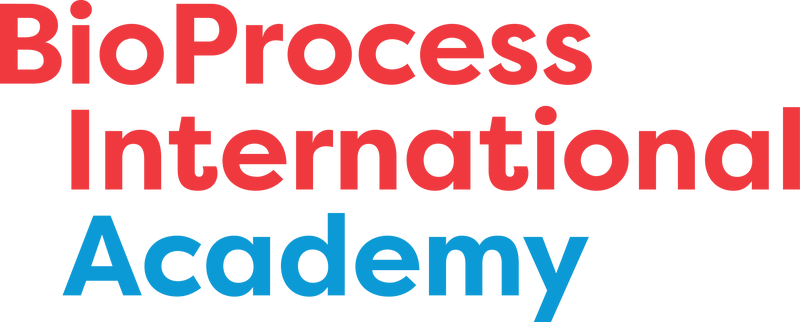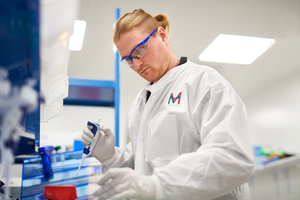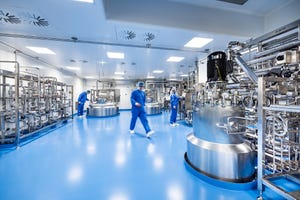- Sponsored Content
- Contract Services
How Did the Pandemic Adjust the CDMO Landscape, and How Will This Sector Change Moving Forward?
Sponsored by Just - Evotech Biologics
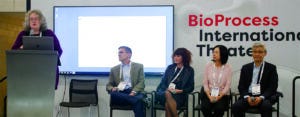
Moderator S. Anne Montgomery (editor in chief, BioProcess International), with panelists (left to right) Richard Richieri (Avid Bioservices), Christelle Dagoneau (Just–Evotec Biologics), Sherry Gu (WuXi Biologics), and David Chang (WuXi AppTec).
The BPI Theater at BIO began its program on Monday afternoon, 5 June 2023, with a panel titled “How Did the Pandemic Adjust the CDMO Landscape, and How Will This Sector Change Moving Forward?”
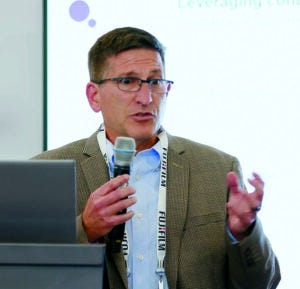
Richard Richieri
Moderator S. Anne Montgomery introduced the panelists. Richard Richieri is the chief operations officer at Avid Bioservices, where he is responsible for current good manufacturing practice (CGMP) operations that include process development, technical operations, facilities, supply-chain management, and manufacturing. He’s been with Avid for more than 18 years, during which time the company has grown from an initial platform of small stainless-steel reactors into the current 115,000-f2 facility housing eight 2,000-L single-use bioreactors.
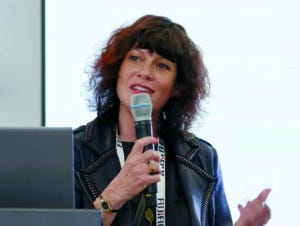
Christelle Dagoneau
Christelle Dagoneau is the senior vice president of business development at Just–Evotec Biologics. She has more than 20 years of international business development and marketing experience in industrial life sciences and for biologics contract development and manufacturing organizations (CDMOs). She leads her team’s focus on shaping innovative business strategies and building a strong industry presence. The company is a global leader in the AI-driven discovery-to-continuous-manufacturing space.
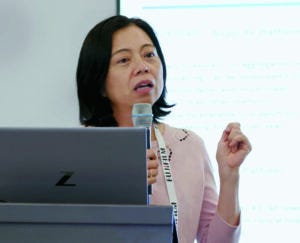
Sherry Gu
Sherry Gu, senior vice president of chemistry, manufacturing, and controls (CMC) management at WuXi Biologics, has been at the forefront of driving sustainable global business growth and leading client projects. She built high-performing CMC teams in the United States and European Union.
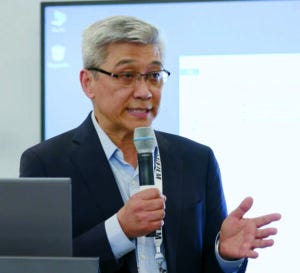
David Chang
David Chang leads WuXi Advanced Therapies’ global technology operations, including process development, analytical development, clinical manufacturing, and testing operations. Chang brings strong leadership and a wealth of experience in cell and gene therapy and in biopharmaceutical technical development, manufacturing operations, engineering, and strategy. He previously worked at Celgene Corporation, a Bristol Myers Squibb company, where he was the corporate vice president and head of cell therapy global manufacturing. He had oversight of the CAR-T manufacturing network and of global manufacturing science and technologies.
Montgomery asked each panelist to highlight key discussion points about the effects of the pandemic on CDMOs.
Supply-Chain, Capacity, and Flexibility (Just–Evotec): Dagoneau identified lessons learned from the supply-chain shortages, the pressure toward faster drug development, and the postpandemic need for flexibility in capacity use. After companies faced shortages in key manufacturing equipment (single-use components, for example), a number of CDMOs and biotechnology companies considered relocating their supply chains to countries and/or companies that are better prepared to maintain needed inventory.
She noted a sort of boomerang effect in which the capacities that had been extended to enable rapid production during the pandemic are now facing less demand. The industry needs the flexibility to use/reuse those capacities for building clinical pipelines. Technologies for continuous bioprocessing are major enablers of both speed and flexibility, which Dagoneau views as important postpandemic considerations for increasing global patient access.
Streamlined Operations (Avid): Richard Richieri became COO of Avid in October 2019. He explained how, during the pandemic, the company grew at an annualized rate of 30–50% in sales based on traditional antibody production. To achieve needed flexibilities, Avid has transitioned from fixed stainless-steel equipment to disposable units, which not only simplifies sterility and cleaning issues, but also adds greater flexibility to process design.
He spoke of his approaches during the pandemic. “I would buy anything and everything to keep the operations going. I learned which vendors were the better ones and which ones could be trusted. Then I learned about my process and about which components could be removed from the process and which ones I didn’t need.”
In his experience, the circumstances of the time forced streamlining in process design. That approach resulted in significant waste reduction — both in waste streams and unused components. As one example, he said that he had trouble during the pandemic acquiring a single-use bioreactor because one small part was unavailable. He and his team examined every step of their process and determined that they didn’t need that part at all. Such streamlining may be “one of the best paths forward that I can think of” as a result of the pandemic.
Despite the strides made in speeding timelines, however, he cautioned that unless regulatory agencies begin to drive/support streamlined operations, “a lot of things will go back to prepandemic ways of thinking.”
Cell and Gene Therapies — Ensuring Business Continuity (WuXi AppTec): David Chang introduced business units within the company that serve the cell and gene therapy industry. With the company’s adenoassociated virus (AAV) and lentivirus vectors and enabling plasmid, it can produce globally in China, the United States (Philadelphia, PA), Singapore, and England (Oxford). To address current and future needs, the company has positioned itself as a fully integrated service provider to fulfill end-to-end testing and analytical services in support of key CMC requirements.
Chang highlighted two lessons from the pandemic: the importance of managing supply-chain resilience and of strengthening business continuity —especially in manufacturing made-to-order autologous cell therapies. The pandemic highlighted weaknesses in staff management: When an operator had to be quarantined, could that person’s shift still be covered? Especially for autologous therapies, he noted the importance of supplying patients more reliably and cost-effectively.
Accelerating Development Timelines (WuXi Biologics): Sherry Gu works in the protein division of WuXi Biologics, supporting protein therapeutic development from preclinical stages through to commercial launch. From her experience, the pandemic provided the impetus to accelerate client programs, leading to valuable lessons in shortening therapeutic timelines overall. She said that her group was able to file 35 COVID antibody projects around the globe, and one therapy was moved from DNA to investigational new drug (IND) application to emergency use authorization (EUA) in 14 months. Other therapies produced at WuXi Biologics have gone from DNA to IND in three to six months. Her COVID-era experience emphasized that working with a CDMO can provide key competitive access to cutting-edge platforms and technologies. What she and her group learned about accelerating elements for the COVID program are now applicable to other therapeutic programs. She showed a number of slides illustrating projects underway and emphasized the importance of flexibility and agility.
Gu also spoke about the importance of supply-chain resilience. Her group seeks to integrate raw materials vertically, approaching raw-material supply globally rather than regionally. To support its platform capabilities, the company keeps about a year’s worth of raw materials in its inventory. The goal of offering a “one-stop-shop” is to reduce client anxieties about supply-chain resilience and to enable collaboration in support of client pipelines.
Discussion (Q&A)
If we were to have another pandemic in a few years, how are you prepared to handle that differently? What changes are you already prepared to enact based on what we’ve experienced in these previous three years?
Dagoneau pointed to technologies that enable better adaptation and increase flexibility to respond quickly within a clinical pipeline. She focused in on the importance of continuous processing. She highlighted a number of facility development projects and collaborations toward achieving that goal.
Gu added that leveraging regional manufacturing will help simplify the supply chain, and that companies are building such potential manufacturing hubs already. Richieri noted the importance also of protecting operators — the people in your company. Paying special attention to shift patterns and creating different workstations around a company can lessen the amount of physical contact that people have with one another, especially in a pandemic. He noted also that the most important lasting effect of the pandemic is that he and his colleagues now have regular contact with suppliers to check on timelines and deliverables.
Chang suggested more futuristic thinking and highlighted the importance of regulatory harmonization. He said that the world was extremely lucky that RNA works and that mRNA can be made quickly and easily. The next pandemic might not have such a technology already poised for rapid development. He would like to see a strong, globally capable World Health Organization (WHO) mandating resources and regulations “like one family of the world” rather than expecting every country to work independently to create a vaccine.
For operating during the pandemic, what changes in CDMO practices were more temporary in nature, and which ones might affect practices going forward?
Chang noted that an “indirect consequence” of the pandemic was that a number of products in development could not achieve the funding to continue. In the current economic crisis, he urges CDMOs to work with both their clients/partners and with regulatory agencies to drive faster progress toward first-in-human trials.
Did your respective companies have to make regulatory compromises to achieve accelerated timelines?
Gu explained that for accelerating the timeline from DNA to IND from 12 to six months, the company used state-of-the-art next-generation sequencing to speed creation of the master cell bank and move into GMP manufacturing. In parallel, the team conducted full testing of the master cell bank so that the data were available at the time of IND application. The sequence of events allowed the team to accelerate the timeline but with no regulatory compromise.
Richieri noted a similar time-saving tactic in which clients asked for creation of stable pools so as to proceed with process development — and then GMP manufacturing uses the final clones. He expects that this trend will continue toward shaving off “a few weeks here, a few weeks here, a few months there.” He also agrees with Chang that it is up to CDMOs to guide use of platforms that will streamline such activities.
How did waste reduction during the pandemic affect your companies’ sustainability profiles, and what changes in material uses did you witness as a result of the pandemic?
Richieri said that as Avid has grown, more and more multinationals are coming in, and sustainability plays a big part in bringing in that business. A key question is, Where can steps be reduced or eliminated entirely without deleterious effects on product quality? He noted that “optimizing processes can focus attention on every little gadget, every filter you use. Is the filter too big? How can you reduce waste by making sure that equipment is the right size from the very beginning of the design phase?”
Dagoneau added that a continuous bioprocessing facility will optimize productivity levels by manufacturing on a smaller scale and bringing in more automation. All such elements result in savings of cost and time.
Gu emphasized how WuXi Biologics is incorporating environmental, social, and governance (ESG) considerations as a design criterion in all its new facilities. And Chang concluded the panel by pointing out how use of disposable equipment and components will lower the carbon footprint overall by eliminating clean- and steam-in-place resources.
Fill out the form below to view the full roundtable discussion now.
You May Also Like


